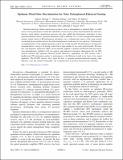Optimum Mixed-State Discrimination for Noisy Entanglement-Enhanced Sensing
Author(s)
Zhuang, Quntao; Zhang, Zheshen; Shapiro, Jeffrey H
DownloadPhysRevLett.118.040801.pdf (440.0Kb)
PUBLISHER_POLICY
Publisher Policy
Article is made available in accordance with the publisher's policy and may be subject to US copyright law. Please refer to the publisher's site for terms of use.
Terms of use
Metadata
Show full item recordAbstract
Quantum metrology utilizes nonclassical resources, such as entanglement or squeezed light, to realize sensors whose performance exceeds that afforded by classical-state systems. Environmental loss and noise, however, easily destroy nonclassical resources and, thus, nullify the performance advantages of most quantum-enhanced sensors. Quantum illumination (QI) is different. It is a robust entanglement-enhanced sensing scheme whose 6 dB performance advantage over a coherent-state sensor of the same average transmitted photon number survives the initial entanglement’s eradication by loss and noise. Unfortunately, an implementation of the optimum quantum receiver that would reap QI’s full performance advantage has remained elusive, owing to its having to deal with a huge number of very noisy optical modes. We show how sum-frequency generation (SFG) can be fruitfully applied to optimum multimode Gaussian-mixed-state discrimination. Applied to QI, our analysis and numerical evaluations demonstrate that our SFG receiver saturates QI’s quantum Chernoff bound. Moreover, augmenting our SFG receiver with a feedforward (FF) mechanism pushes its performance to the Helstrom bound in the limit of low signal brightness. The FF-SFG receiver, thus, opens the door to optimum quantum-enhanced imaging, radar detection, state and channel tomography, and communication in practical Gaussian-state situations.
Date issued
2017-01Department
Massachusetts Institute of Technology. Department of Electrical Engineering and Computer Science; Massachusetts Institute of Technology. Department of Physics; Massachusetts Institute of Technology. Research Laboratory of ElectronicsJournal
Physical Review Letters
Publisher
American Physical Society
Citation
Zhuang, Quntao, Zheshen Zhang, and Jeffrey H. Shapiro. “Optimum Mixed-State Discrimination for Noisy Entanglement-Enhanced Sensing.” Physical Review Letters 118.4 (2017): n. pag. © 2017 American Physical Society
Version: Final published version
ISSN
0031-9007
1079-7114